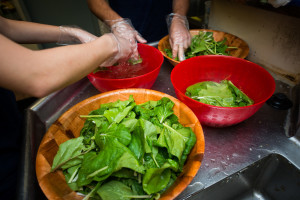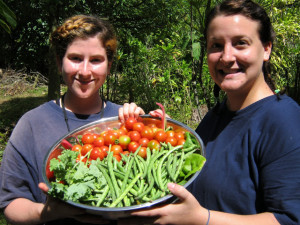 At Pacific Quest, students learn that what you put in your body directly affects how you feel. The Pacific Quest diet has been developed to provide balanced and vital nutrition. We take advantage of locally grown foods in Hawaii so that food is always fresh and healthy. We are fortunate to have an incredible local source of beef on the Big Island from the Galimba family at Kuahiwi Ranch. The students also enjoy fresh fish and a variety of fruits and vegetables that are grown in our organic gardens at PQ or other nearby farms.
At Pacific Quest, students learn that what you put in your body directly affects how you feel. The Pacific Quest diet has been developed to provide balanced and vital nutrition. We take advantage of locally grown foods in Hawaii so that food is always fresh and healthy. We are fortunate to have an incredible local source of beef on the Big Island from the Galimba family at Kuahiwi Ranch. The students also enjoy fresh fish and a variety of fruits and vegetables that are grown in our organic gardens at PQ or other nearby farms.
We teach the basics of nutrition and how the body uses food as fuel. Purified water and herbal teas are the only liquids provided and students are taught how high sugar diets contribute to fluctuating blood sugar levels, which can cause mood changes and energy crashes. Students learn how to cook and prepare food using the freshest and most natural ingredients.
At Pacific Quest, we believe food is medicine and fuel for the body. We provide whole foods, hypoallergenic, anti-inflammatory, and blood sugar balancing diet, rich in critical nutrients for optimizing health. The Pacific Quest diet consists of whole grains, vegetables, fruits, nuts, local protein sources, healthy fats, limited amounts of dairy and no refined sugars or processed foods.
Eating nutritious food, free of refined sugar, artificial chemicals and harmful substances helps our adolescents and young adults feel better and have adequate energy for optimal engagement in the therapeutic process.
We emphasize the importance of eating in a relaxed setting to optimize digestion. The students are encouraged to chew their food well and take their time to eat. The basics of nutrition are discussed as well as the building blocks of a healthy diet. Pacific Quest cultivates the students’ appreciation of the evolution of their food from the soil to their plates while they harvest and cook many of their own meals.
Pacific Quest’s list of typical foods:
Protein: fish, eggs, yogurt, lentils, tofu, beans, chicken, beef, nuts, seeds, and hummus.
Starches: pita, oats, gluten-free pasta, taro, potato, rice, quinoa, corn tortillas and sweet potato.
Vegetables: tomato, zucchini, carrot, broccoli, eggplant, celery, cauliflower, squash, beets, onion, green beans, kale, spinach, corn, peppers, radish,
Fruits: apple, papaya, banana, passion fruit, guava, pineapple, watermelon, honeydew, cantaloupe, orange, and avocado.
Herbs: dill, garlic, lemon, lemongrass, lime, thyme, rosemary, basil, ginger, cilantro, parsley, fennel, nasturtium, turmeric, green onion, and mint.
Nuts: cashews, almonds, macadamia nuts, walnuts and soy nuts.
Seeds: pumpkin seeds and sunflower seeds.
Condiments: parmesan cheese, soy sauce, braggs amino acids, coconut oil, olive oil, salt, pepper, vinegar, honey, peanut butter, yogurt.
Whey protein powder: weight maintenance supplement.
Snack: consist of granola, raisins, soy nuts, almonds, sunflower seeds, pumpkin seeds and cashews.
Water: The students drink 96 ounces of water daily. We encourage them not to drink a lot of water while they eat as it will inhibit digestion.
Examining the First Pillar of Health: Nutrition
At Pacific Quest, students learn that what you put in your body directly affects how you feel. The Pacific Quest diet has been developed to provide balanced and vital nutrition. We take advantage of locally grown foods in Hawaii so that food is always fresh and healthy. We are fortunate to have an incredible local …
We teach the basics of nutrition and how the body uses food as fuel. Purified water and herbal teas are the only liquids provided and students are taught how high sugar diets contribute to fluctuating blood sugar levels, which can cause mood changes and energy crashes. Students learn how to cook and prepare food using the freshest and most natural ingredients.
At Pacific Quest, we believe food is medicine and fuel for the body. We provide whole foods, hypoallergenic, anti-inflammatory, and blood sugar balancing diet, rich in critical nutrients for optimizing health. The Pacific Quest diet consists of whole grains, vegetables, fruits, nuts, local protein sources, healthy fats, limited amounts of dairy and no refined sugars or processed foods.
Eating nutritious food, free of refined sugar, artificial chemicals and harmful substances helps our adolescents and young adults feel better and have adequate energy for optimal engagement in the therapeutic process.
We emphasize the importance of eating in a relaxed setting to optimize digestion. The students are encouraged to chew their food well and take their time to eat. The basics of nutrition are discussed as well as the building blocks of a healthy diet. Pacific Quest cultivates the students’ appreciation of the evolution of their food from the soil to their plates while they harvest and cook many of their own meals.
Pacific Quest’s list of typical foods:
Protein: fish, eggs, yogurt, lentils, tofu, beans, chicken, beef, nuts, seeds, and hummus.
Starches: pita, oats, gluten-free pasta, taro, potato, rice, quinoa, corn tortillas and sweet potato.
Vegetables: tomato, zucchini, carrot, broccoli, eggplant, celery, cauliflower, squash, beets, onion, green beans, kale, spinach, corn, peppers, radish,
Fruits: apple, papaya, banana, passion fruit, guava, pineapple, watermelon, honeydew, cantaloupe, orange, and avocado.
Herbs: dill, garlic, lemon, lemongrass, lime, thyme, rosemary, basil, ginger, cilantro, parsley, fennel, nasturtium, turmeric, green onion, and mint.
Nuts: cashews, almonds, macadamia nuts, walnuts and soy nuts.
Seeds: pumpkin seeds and sunflower seeds.
Condiments: parmesan cheese, soy sauce, braggs amino acids, coconut oil, olive oil, salt, pepper, vinegar, honey, peanut butter, yogurt.
Whey protein powder: weight maintenance supplement.
Snack: consist of granola, raisins, soy nuts, almonds, sunflower seeds, pumpkin seeds and cashews.
Water: The students drink 96 ounces of water daily. We encourage them not to drink a lot of water while they eat as it will inhibit digestion.
Questions? Call or Text our Admissions Team: 808-937-5806